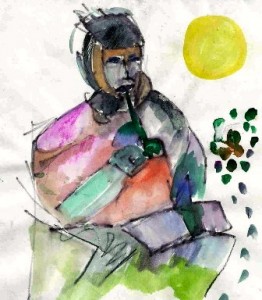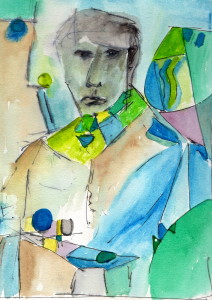Imagination:
Uses and misuses
Some preliminary thoughts which could also be afterthoughts
I guess it helps to start with the brain when talking about imagining vs. experiencing reality. Patterns of brain activity are different when we are experiencing the real world when compared to the brain in imagination mode. This may not be a surprise but it helps to have that notion confirmed by scientific evidence, like findings from brain imaging studies. If interested in the detail of the their findings you might Google Tononi (and colleagues) who published some of the details of the patterns of brain in processing reality or imagining in their paper published in the November issue of Neuroimage.
So then what. Some more thoughts that may or may not potentially explain some of the goings on in Barth’s brain.
Imagination can often trump reality. We can imagine accomplishing all sorts of feats that feel almost real and realized. Then we enter the world of action and our imagination falls flat, lifeless. Imagination is a sort of simulation that is never a real substitute for the real thing.
I don’t have a real jumping off point or sense or even an intuitive feel for what allows us to conjure up our imagination. How does our brain manage to conjure up imaginings based on actions and knowledge that are generated with…..with what…..which brain circuits, knowledge networks, balanced dances between inhibition and disinhibition, transformations of previous experiences. What might be candidates that are the neural hardware and software foundations of imagination? Is that question a bit like asking about the neural substrates for consciousness, or awe, or love? Best kept off the table.
However, clearly, our imagination can bring us to places that are beyond the possible and by imagining we can model and simulate scenarios that can provide us with insights and possibilities that can then be applied to our view of realities of life. Imagined perspectives are then a springboard for new views of our world.
Can you teach how to imagine a whole range of scenarios? Can children imagine more effectively than adults and if so how did we lose that skill?
Are hallucinations a special kind of imagining, a special case of imagination leading to thinking action?
What does it take to be a skilled imaginer? Do you have to be smart, or creative, or prickly, or a loner, or shy and outside the mainstream of socialization?
Does frequent stirrings of imagination build a stronger brain one capable of wandering further, faster, longer?
Do you have to think fast to imagine vividly and is fast thinking imagining a good way to check mate reality, to push the real world off the boards so that it does not interfere with your own creation, your special brain video?
The there are so many expressions of imagination that knock us off our feet and we then hit the pavement, nose first.
More
So many forms of nonsense imaginings.
Kids imagine that they know there stuff and will ace a test and then they even go on to imagine that they did very well only to find out that they failed, miserably.
Think of others who would tell you that this time they know that they will be able to stop drinking or breaking their cocaine habit. In their mind’s eye that stand up proudly and announce to themselves that they are confident that they are in just the right place to stop their addiction, tomorrow.
Most of the time this imagining is no more realistic than someone convinces that they can fly. They can see themselves soaring above the skyline, soaring gracefully up down and around and so they might consider jump from a rooftop and on the way down they realize that the imaginings did not have either legs or wings, or balloons to keep them from their death.
Barth (the artist that is being studied as part of the Lives Lived Project which will be posted some time in the next few weeks) thought that, when it came to the world of art, he knew it all, more than any of his contemporaries. He imagined creating a world wide Bauhaus linking all the arts and all the art institutions, and schools that taught crafts, dance, music. He could feel it in his bones that he was destined to be the world leader in the arts. That is an imagination that is full blown and with magical legs.
More
Can an elephant imagine what it would feel like to take a cool bath on a hot day, or better yet, that this bull can successfully take on the head of the herd?
Can you imagine being an elephant without having a history of walking around with a huge trunk and tusks?
Is the content of our imagination another form of our brains generating and using symbols or language as cognitive tool chest for generating thinking? Our imaginings may be still images, videos, scripts, a dialogue in the mind, but all manufactured products of brain activity based on acquired knowledge, experience.
As humans our imaginings can take us to all sorts of places. Those imaginings can be based on random dribble or ‘real’ past experiences. No doubt that the products of our imagination can have a powerful influence on what we do, how we think and feel about ourselves and others in our world. Our imagination can also form the basis of our irrational attitudes towards people, events, our predictions of what is likely to be. Our imagination serves as powerful key determinants of how we live our lives.
Most people when asked whether it is a good thing to have a rich imagination would say ‘of course’. Of course you can come back to that question, “Really, all good?”. No doubt imagination is very useful in many situations but on the other hand when imagination is a substitute for reality it can have crippling consequences.
We add our own touch to everything we remember, what we see, hear, feel. In our minds eye, we scan the world beyond our nose but, at the same time, we embellish that experience with the self-generated content on the screen inside our head. Our imagination along with big servings of acquired knowledge can make what is real a much richer experience than the one based solely on a conventional copy of reality. It can also serve as the basis for our distortions of the world outside our skin as well as generating a reality substitute, through our own imaginings.
While our imagination can be a powerful motivator in our lives, it can also run amok leaving us crippled, stuck in neutral. Think of the thought processes, the imaginings of the alcoholic who can picture staying off booze tomorrow but not today. They might imagine that this time it will be much easier to stop drinking, that they finally have a handle on the closed bottle of alcohol. It makes for a comforting video that serves as a substitute for the difficult reality of not drinking…..or not overeating….or dieting…or. No doubt that one of the shortcomings of the use of our imagination is that we paint a picture of smiling faces, of making it look easy when in fact it is super hard to diet, stop drinking and so on.
Perhaps imagining that we are someone else can help us stick with a diet that would ordinarily be difficult to follow (see the posting on this site entitled,
Similarly, school kid often imagine they aced an exam, or are well prepared for a test that they barely studied for, or that they know all about a topic that is, at best barely familiar to them. Imagination fills in the gap between reality and what they wish were true.
Role play as a form of Imagination
Some uses of imaginings, of imagination, can, like a placebo, drive someone into actions that might ordinarily seem beyond them. For example one can imagine being slim instead of fat, thinking of oneself as not having an eating disorder. With that imaginary picture of self in mind they might find themselves motivated and energized to diet effectively (see the posting on this website called Lose weight by acting thin).
It turns out that Barth had taken classes in acting. Perhaps he was deliberately planning to take on the role of “The high Priest of the Arts”. If that were the case would that imply that he was being clever, manipulative or crazy or even all of these qualities?
In another posting as part of the Lives Lived Project (on the life of the artist Barth) I commented that Barth may have taken on a role in which he was the conductor of the entire world of art. I wrote:
“It would almost seem like his imagination took him to a place, a role that he played as if it was not the artist Barth but rather the conductor/composer of all of the arts. At one point he told Ian that he pictured himself on a stage filled with all of the artist and artisans of the world. He stood there in front of all of them with his baton raised. Could this be the musing of Barth’s brain run amok?
In reflecting on some of Ian’s notes on the Barth grandeur I couldn’t help thinking back to a time when I posted an article on my website that described an actor’s studio workshop that taught the overweight clients to take on role in which the character was thin, alive with energy rather than a candy bar in their mouth. While the posting was fiction the notion of using imagination to role-play had some intriguing possibilities.”
Consider working with imagination in a context that includes others.
Well for Günther Barth (Lives Lived Project) there are no others and listening to others is not considered worth the ride. In addition team work is not what he considers worthwhile unless it consists of him telling others what he wants them to do and they asking for help in complying with his wishes.
- Listening to what others have to say. Doesn’t matter how smart you are or think you are you can never think of everything that can impact a valued product of your imagination? Another perspective, someone else’s expertise and knowledge can never hurt and can temper, strengthen the product of our imagination.
- Incubation. Over time, the product of your imagination won’t grow either stale or become overripe and rotten. Second, third, fourth looks of what your imaginings have produced will enhance the product of your mind.
- Most complex problems are best accomplished as a ‘team sport’. If you feel that your ideas are only shared when it reflects on you and who you are then don’t bother sharing your thoughts, ideas with others. But if you think the ideas you come up with have value aside from being the product of you head then give others a chance to work with you to enhance the product of your mind.
- Don’t be too stubborn and filled with your self-worth. The brilliant Alfred Wallace, the co-discoverer with Darwin of natural selection, stuck to his guns in his commitment to his beliefs about the value (and scientific foundations) of psychic phenomena, spiritualism and phrenology. All the evidence around him suggested that those ideas were nuts but, as you know, strong beliefs are there forever especially if they make no sense.

